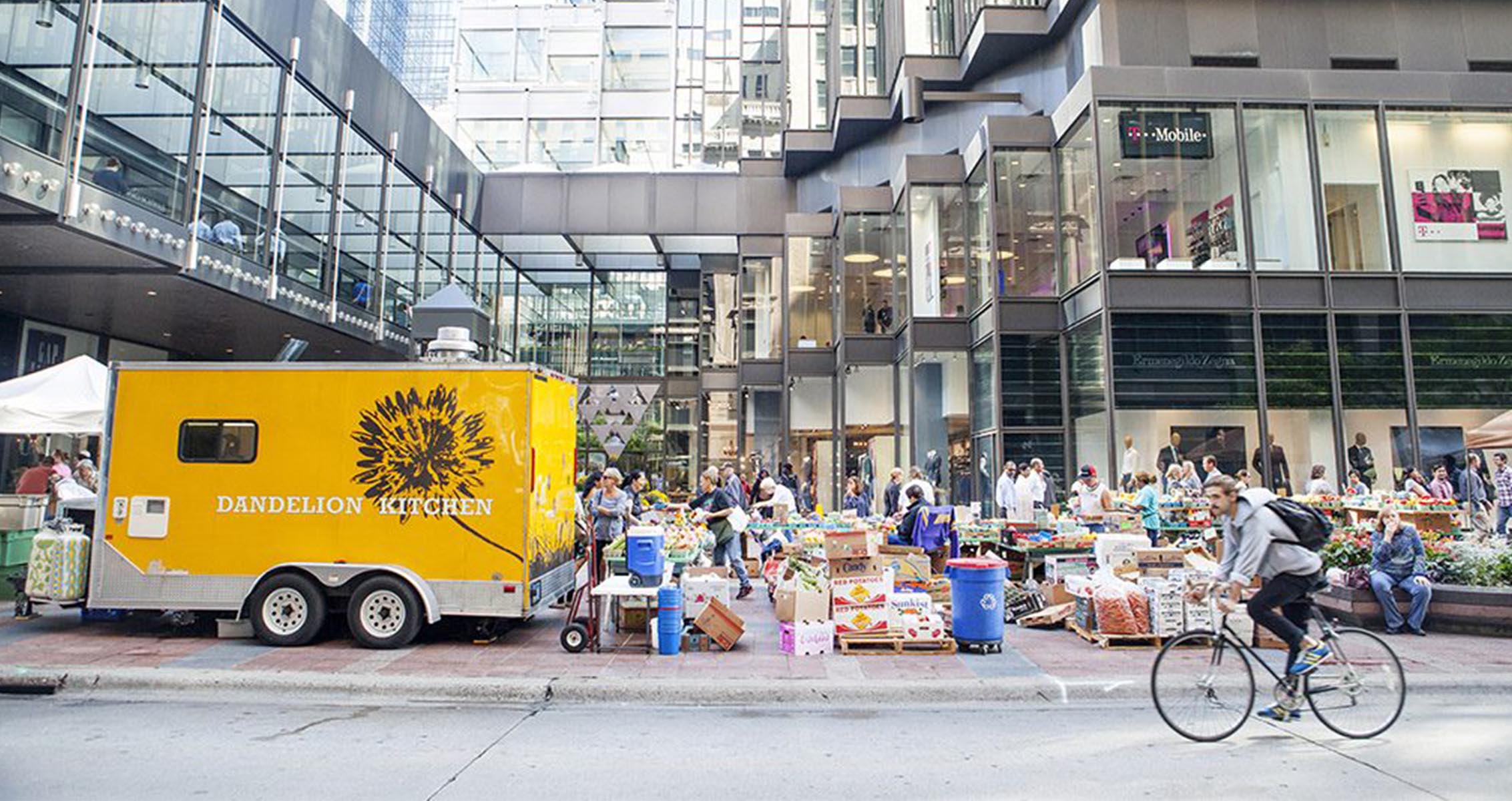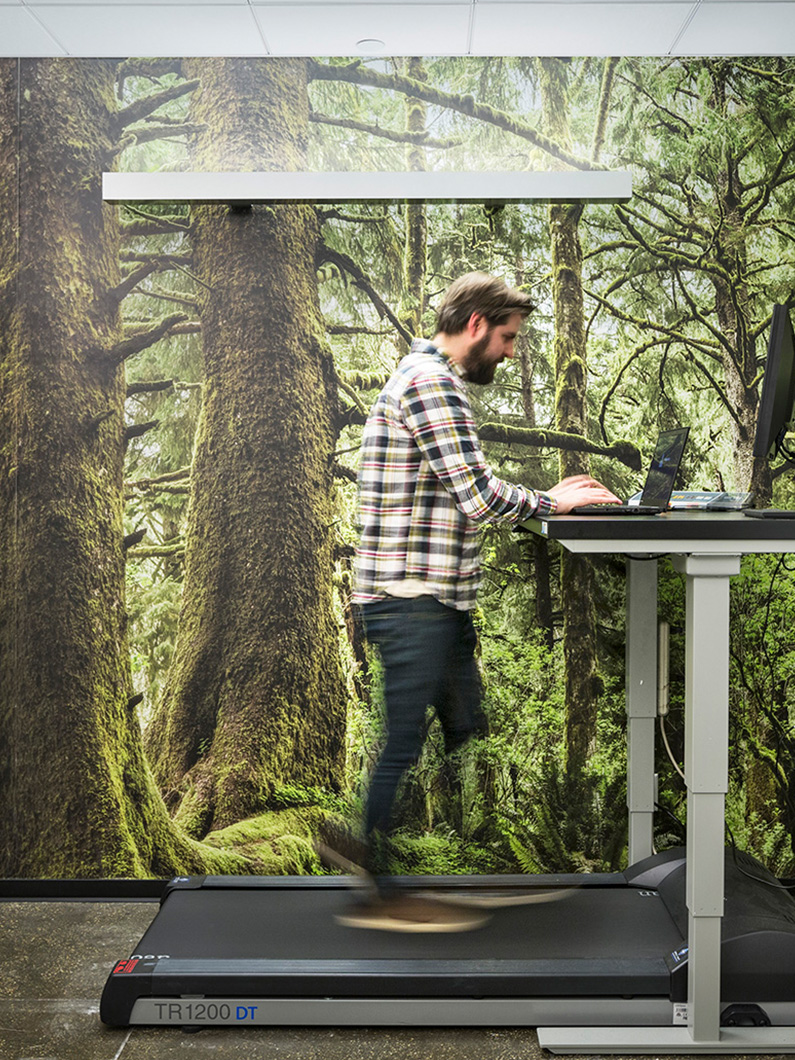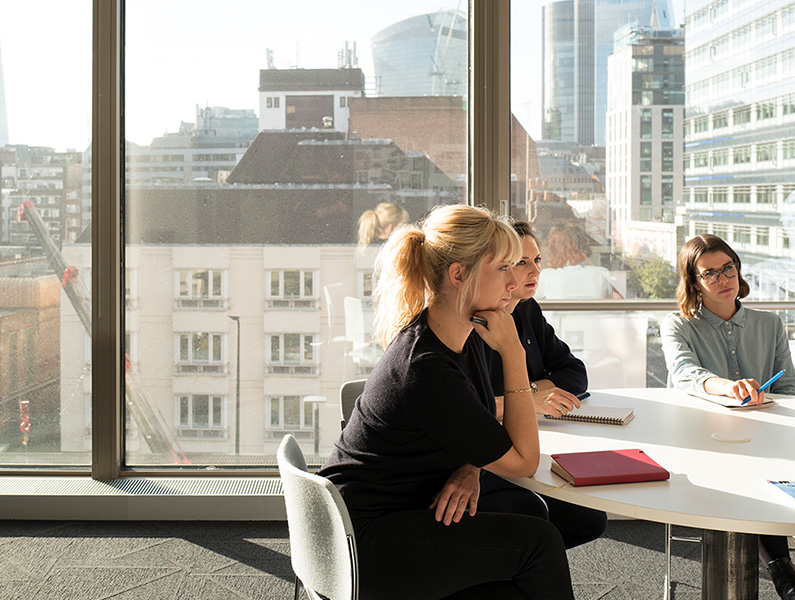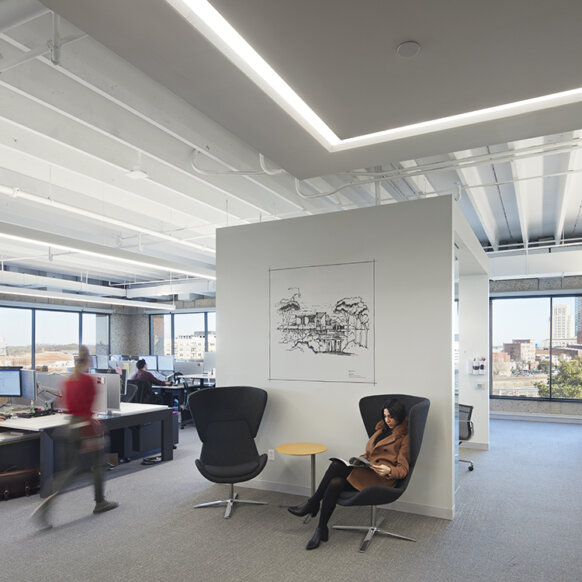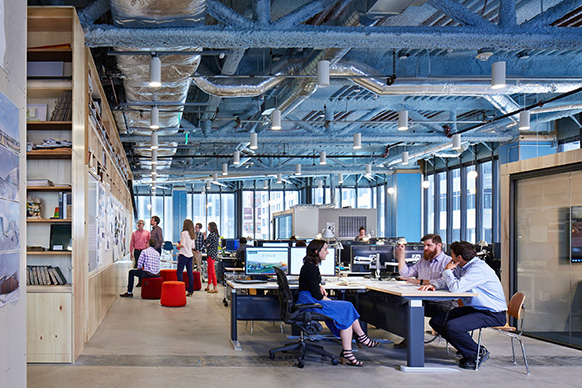Four years ago, Perkins&Will became the first company to pursue – with intent to achieve – Fitwel certification for all of its North American studios. Fitwel, an evidence-based design standard, encourages positive impacts on building occupant health and well-being through improvements to workplace design and policies.
The standard boasts seven health impact categories that evaluate a space’s performance. Nine of our Perkins&Will studios have achieved Fitwel certification to date. To celebrate, we’re highlighting some of the strategies our certified studios put in place to achieve points in each of the health impact categories.
New York Studio and Toronto Studio // Increase physical activity
2 Star Rating
New York City can add another superlative to its list: “the city with the most steps.” That’s according to a recent report from Fitbit, which showed the state of New York leading the nation in daily step count. Fitbit attributed the top ranking to New York City dwellers, who use walking as one of their primary forms of transportation.
So it comes as no surprise that our New York studio, located smack dab in the middle of Union Square, earned maximum points for Fitwel’s Walk Score credit. A high walk score indicates that building occupants are more likely to walk, bike, or take public transportation to work, increasing physical activity by virtue of location alone.
Toronto is keeping pace with New York City after being ranked as the 3rd most walkable Canadian city by Redfin. Our Toronto studio capitalized on this by selecting a building centrally located to public transportation options as well as “The PATH,” a mostly underground pedestrian walkway network. The PATH spans 30 kilometers and allows employees to comfortably maintain their step counts as the temperatures drop.
Atlanta Studio // Promote occupant safety
2 Star Rating
With fast-paced projects and looming deadlines, workplace safety is unlikely top-of-mind for the average knowledge worker. But that’s not to say that occupant safety is unimportant. In fact, many companies employ a “better safe than sorry” mindset by not only meeting – but exceeding – the requirements of emergency preparedness compliance.
For example, our Atlanta studio is equipped to handle shocks and stressors associated with natural disasters, health emergencies, and even man-made threats. Not only do these strategies help keep employees safe, they also ensure business continuity during and after emergencies.
Durham Studio // Reduce morbidity and absenteeism
1 Star Rating
While pollution in urban areas makes headline news, we might not give the air we breathe in the workplace a second thought, assuming it would not interfere with our health and happiness. But that’s not always the case: Indoor air quality can pose significant threats to building occupants because of toxins, contaminants, and odors.
Fortunately, there are plenty of resources to ensure that spaces are well ventilated and protected from pollutants. For example, our Durham office used guidelines provided in Perkins&Will’s Green Operations Plan to form an indoor air quality (IAQ) policy. This strategy helps identify areas for improvement, and provides benchmarks to ensure quality remains high over time.
Minneapolis Studio // Support social equity for vulnerable populations
2 Star Rating; the first Fitwel certified Commercial Interior Space in the state of Minnesota
Farmers markets provide access to seasonal goodies and support local economies to boot. Fortunately, our Minneapolis studio is located within the city’s IDS Center, which boasts The Crystal Court Farmers Market. Every Tuesday, local farmers led by Living Greens Farm gather in the building’s atrium, allowing our Minneapolis colleagues to purchase local produce and other seasonal items year-round. Best of all, 10 percent of farmers market proceeds go to local charity.
Washington, DC Studio // Provide healthy food options
3 Star Rating
Since the workplace is often an infamous source of extra calories (hello, bowls of leftover Halloween candy throughout the office), Fitwel certification awards points for offices that adopt and incentivize healthy food and beverage selection. Some of these points are awarded for straightforward strategies, like providing access to free water in spaces where people break bread, but creative solutions are also rewarded.
Our Washington, DC studio doesn’t have a dedicated cafeteria to purchase food, but each pantry (food-prep area) is stocked with fresh fruit, snacks, and zero-calorie sparkling water. To further incentivize healthy eating practices, pantries come equipped with small plates and measuring cups to control portion size options. This offering speaks to wallets and appetites at the same time: All snacks are provided free of charge.
San Francisco Studio // Impact community health
1 Star Rating
Fitwel’s emphasis on community health highlights the close connections between economic and workforce development. Companies in the Bay Area are facing growing scrutiny on how they interact with their local community as the cost of living for residents continues to skyrocket. Perks that often go hand-in-hand with the tech industry, like on-site cafeterias, gyms, medical offices, and concierge services, are increasingly characterized as detached from the local economy. So it was critical that our San Francisco office address community health directly through design.
Our Bay Area colleagues created a pin-up area that highlights amenities within a 10 minute walk of their studio. Employees are also invited to post information about local events that have special interest for the design community. By posting these resources in a heavily-trafficked area within their space, our San Francisco studio is taking a necessary step towards community engagement.
London Studio and Austin Studio // Instill feelings of well-being
2 Star Rating
Common workplace frustrations like noise and poor lighting often leave people pining for the days of private offices. Even though the open plan is likely here to stay, when choice and control are taken into account, design can facilitate comfortable, and even energizing, experiences at work. Both our London and Austin studios invested in supportive, flexible work strategies.
Our London studio sits on one large floorplate, but provides dozens of alternative work seats, allowing employees to match their work setting with the task at hand. Open and enclosed collaboration spaces, quiet rooms for focus work, and multipurpose areas empower employees to choose where and how they work throughout the day.
For many in the office, workstations function as “home base” when they’re not using alternative workspaces, and for good reason: All workstations have full access to natural daylight and views. Even better, operable shading allows employees to further tailor their environment to suit their needs.
Our Austin studio was designed with visible transparency and community in mind. Similar to our London studio, large communal spaces are punctuated with dedicated private areas to support different employee needs. All workstations are equipped to sit or stand at, further empowering employee choice.
With several more of our studios awaiting certification – and still more to pursue – we will continue to apply these wellness strategies for the benefit of our own colleagues and beyond. After all, with growing demand for Fitwel certification (and healthy spaces in general), these studios are truly living labs where we can test ideas and document best practices to pass onto our clients.
